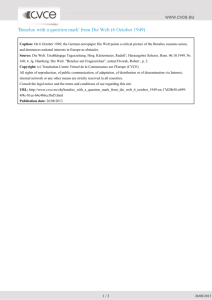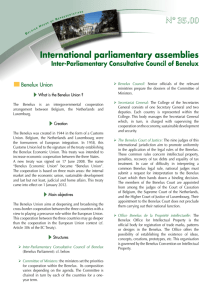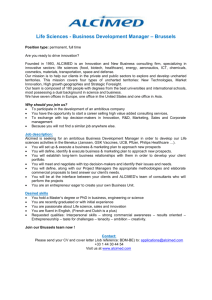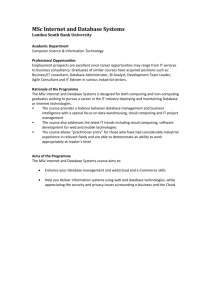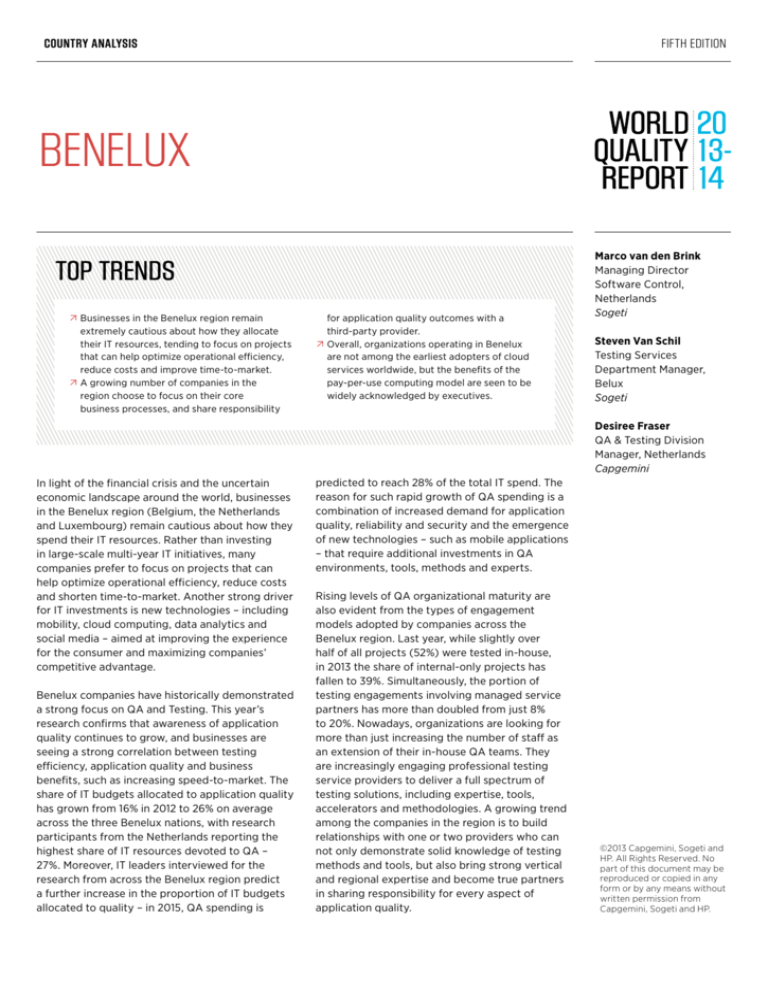
COUNTRY ANALYSIS
FIFTH EDITION
Benelux
Top Trends
¸¸ Businesses in the Benelux region remain
extremely cautious about how they allocate
their IT resources, tending to focus on projects
that can help optimize operational efficiency,
reduce costs and improve time-to-market.
¸¸ A growing number of companies in the
region choose to focus on their core
business processes, and share responsibility
for application quality outcomes with a
third-party provider.
¸¸ Overall, organizations operating in Benelux
are not among the earliest adopters of cloud
services worldwide, but the benefits of the
pay-per-use computing model are seen to be
widely acknowledged by executives.
Marco van den Brink
Managing Director
Software Control,
Netherlands
Sogeti
Steven Van Schil
Testing Services
Department Manager,
Belux
Sogeti
Desiree Fraser
QA & Testing Division
Manager, Netherlands
Capgemini
In light of the financial crisis and the uncertain
economic landscape around the world, businesses
in the Benelux region (Belgium, the Netherlands
and Luxembourg) remain cautious about how they
spend their IT resources. Rather than investing
in large-scale multi-year IT initiatives, many
companies prefer to focus on projects that can
help optimize operational efficiency, reduce costs
and shorten time-to-market. Another strong driver
for IT investments is new technologies – including
mobility, cloud computing, data analytics and
social media – aimed at improving the experience
for the consumer and maximizing companies’
competitive advantage.
Benelux companies have historically demonstrated
a strong focus on QA and Testing. This year’s
research confirms that awareness of application
quality continues to grow, and businesses are
seeing a strong correlation between testing
efficiency, application quality and business
benefits, such as increasing speed-to-market. The
share of IT budgets allocated to application quality
has grown from 16% in 2012 to 26% on average
across the three Benelux nations, with research
participants from the Netherlands reporting the
highest share of IT resources devoted to QA –
27%. Moreover, IT leaders interviewed for the
research from across the Benelux region predict
a further increase in the proportion of IT budgets
allocated to quality – in 2015, QA spending is
predicted to reach 28% of the total IT spend. The
reason for such rapid growth of QA spending is a
combination of increased demand for application
quality, reliability and security and the emergence
of new technologies – such as mobile applications
– that require additional investments in QA
environments, tools, methods and experts.
Rising levels of QA organizational maturity are
also evident from the types of engagement
models adopted by companies across the
Benelux region. Last year, while slightly over
half of all projects (52%) were tested in-house,
in 2013 the share of internal-only projects has
fallen to 39%. Simultaneously, the portion of
testing engagements involving managed service
partners has more than doubled from just 8%
to 20%. Nowadays, organizations are looking for
more than just increasing the number of staff as
an extension of their in-house QA teams. They
are increasingly engaging professional testing
service providers to deliver a full spectrum of
testing solutions, including expertise, tools,
accelerators and methodologies. A growing trend
among the companies in the region is to build
relationships with one or two providers who can
not only demonstrate solid knowledge of testing
methods and tools, but also bring strong vertical
and regional expertise and become true partners
in sharing responsibility for every aspect of
application quality.
©2013 Capgemini, Sogeti and
HP. All Rights Reserved. No
part of this document may be
reproduced or copied in any
form or by any means without
written permission from
Capgemini, Sogeti and HP.
WORLD QUALITY REPORT 2013-14
|}
COUNTRY ANALYSIS
Download the World Quality Report 2013-14 at www.worldqualityreport.com
In the Benelux region, mobile testing is one of
the fastest-growing areas of partnership between
businesses and professional services providers.
Mobility is seen as a strategic business opportunity,
and companies realize the importance of providing
consistent, reliable and secure experiences to
customers on their mobile devices. Although 56%
of research participants state that they currently
test mobile applications, most companies lack the
methodologies (69%), variety of devices (57%),
appropriate environments (48%), and experts
(43%) to thoroughly test their mobile offerings
in-house. Engaging service providers with a full
range of mobile capabilities is rapidly becoming a
cost-efficient solution for companies who choose
to focus on their core business processes but want
to stay competitive in the mobility area.
In addition, more businesses are turning to
providers with offshore capabilities in an effort
to save costs (the distribution of offshore testers
has increased from 24% in 2012 to 29% in 2013).
However, the offshore component varies among
different sectors and countries in the region. For
example, Luxembourg’s strongest industry is the
Financial Services sector, which is governed by
strict data privacy laws, requiring all sensitive data
to stay within the country. On the other hand,
many Belgian and Dutch companies benefit from
the cost savings of offshoring engagements – at
least for some part of their testing function.
The research shows that the trend towards
centralizing and industrializing the QA function
in the region is still going strong. Last year,
an average of 37% of interviewed CIOs and IT
directors reported that they had no plans for
establishing a Testing Center of Excellence
(TCOE). This year, the proportion has dropped to
just 29%. Nearly a third (32%) of respondents state
that they are planning to set up a TCOE either
internally or using a third-party provider, and a
further 6% say that their TCOE building efforts
are already well underway. What’s more, in 2012
only 6% of participants reported that their internal
TCOEs were fully operational, while this year,
nearly one in five (19%) of interviewed CIOs and IT
directors confirms that they have centralized their
testing function using in-house TCOEs, with an
additional 13% using third-party capabilities.
The Benelux businesses are also widely adopting
agile development methods. Although many
companies have been practicing different forms of
agile for nearly a decade, recently it has become
evident that most are only beginning to truly
realize the importance of quality in agile delivery,
and bringing quality and testing activities into
every aspect of the application cycle. The promise
of faster application delivery and shorter time-tomarket is driving even the largest organizations
to implement agile methodologies, and they are
bringing their testing practices and maturity levels
over to agile projects.
Benelux
26%
of the IT budget is spent
on QA and Testing
69%
of businesses cite lack
of adequate processes
and methodologies as a
barrier to mobile testing
The Benelux companies are not among the earliest
adopters of cloud services, but the benefits
of the pay-per-use model are becoming very
attractive to companies who want to control their
spending on IT tools and infrastructure. This year’s
research found that today, on average 20% of all
applications in Benelux are hosted in the Cloud,
and 24% of all testing occurs in cloud-based
environments – on a par with the global average.
However, by 2015, it is expected that as many as
26% of all applications will be migrated to the
Cloud, and 31% of testing will be cloud-based.
In the future, Benelux companies and Public
Sector organizations are likely to continue with
industrialization and centralization initiatives,
while maintaining high levels of investment in
QA and Testing. Testing is already viewed as a
specialized discipline, and with the rise of mobility
and cloud computing, the importance of Testing
will continue to grow.
© 2013 Capgemini, Sogeti and
HP. All Rights Reserved. No
part of this document may be
reproduced or copied in any
form or by any means without
written permission from
Capgemini, Sogeti and HP.




